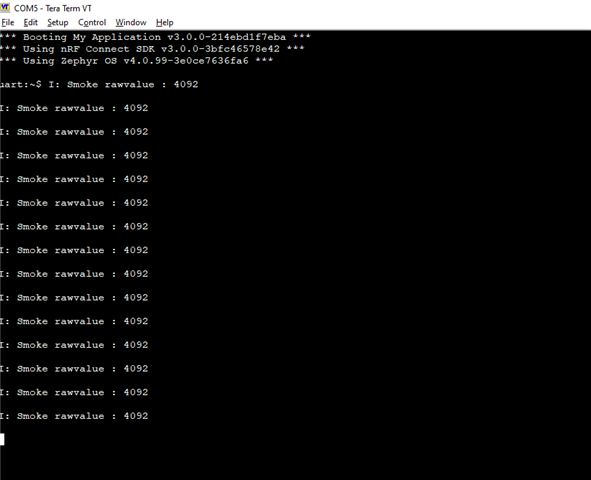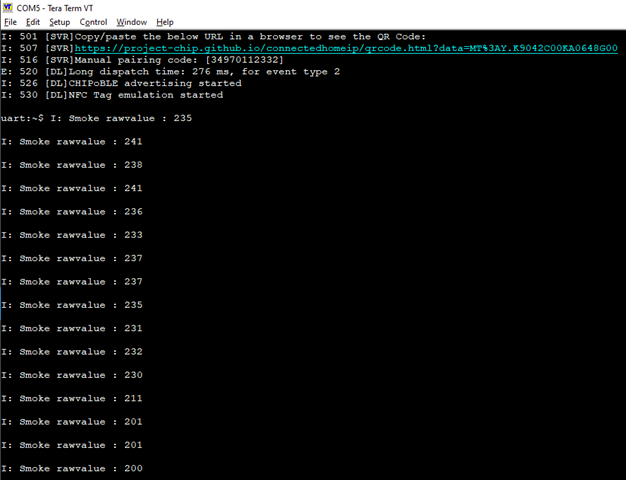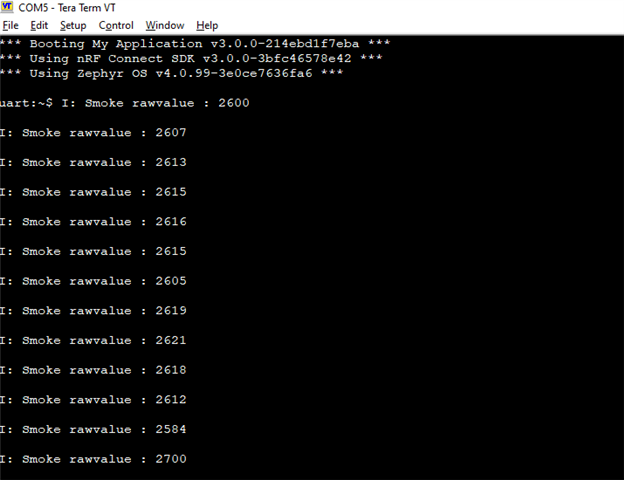Hello Nordic team,
For the (POC), I configured ADC channel 1 and interfaced a potentiometer to pin P1.14. The ADC was set up to read the potentiometer's raw value./ {
zephyr,user {
io-channels = <&adc 1>;
};
};
&adc {
#address-cells = <1>;
#size-cells = <0>;
channel@1 {
reg = <1>;
zephyr,gain = "ADC_GAIN_1";
zephyr,reference = "ADC_REF_INTERNAL";
zephyr,acquisition-time = <ADC_ACQ_TIME_DEFAULT>;
zephyr,input-positive = <NRF_SAADC_AIN7>; // P1.14
zephyr,resolution = <12>;
zephyr,oversampling = <2>; // Enable oversampling with a factor of 2
};
};
As part of "Exercise 1 – Interfacing with ADC using Zephyr API", we configured and initialized the ADC, and invoked it within the main() function.
We also added a function call to read the ADC value, as demonstrated in the following code snippet://adc.cpp
int32_t readValue(void)
{
int err;
err = adc_read_dt(&smoke_adc, &smoke_seq);
if (err < 0) {
LOG_ERR("Smoke ADC read failed (%d)", err);
return err;
}
LOG_INF("Smoke rawvalue : %d\n",smoke_buf);
}
To analyze the ADC readings, we considered two scenarios:
1) As shown in the code below, we called the readValue() function within the while(1) loop in main.cpp.//main.cpp
int_main()
{
if(smoke_init())
{
LOG_ERR("Smoke init failed");
}
while(1)
{
readValue();
k_msleep(1000);
}
commenting StartApp function
CHIP_ERROR err = AppTask::Instance().StartApp();
LOG_ERR("Exited with code %" CHIP_ERROR_FORMAT, err.Format());
return err == CHIP_NO_ERROR ? EXIT_SUCCESS : EXIT_FAILURE;
}
2) The readValue() function is called every second using a timer, which is initialized through the SensorTimerHandler in the AppTask::Init() function.
This function also initializes the Matter stack.
CHIP_ERROR AppTask::Init()
{
/* Initialize Matter stack */
ReturnErrorOnFailure(Nrf::Matter::PrepareServer());
if (!Nrf::GetBoard().Init(ButtonEventHandler)) {
LOG_ERR("User interface initialization failed.");
return CHIP_ERROR_INCORRECT_STATE;
}
k_timer_init(&mSelfTestLedTimer, &SelfTestLedTimerTimeoutCallback, nullptr);
k_timer_init(&mSelfTestTimer, &SelfTestTimerTimeoutCallback, nullptr);
/* Register Matter event handler that controls the connectivity status LED based on the captured Matter network
* state. */
ReturnErrorOnFailure(Nrf::Matter::RegisterEventHandler(Nrf::Board::DefaultMatterEventHandler, 0));
/* Register Smoke CO Alarm test event triggers */
#ifdef CONFIG_NCS_SAMPLE_MATTER_TEST_EVENT_TRIGGERS
/* Register Smoke CO alarm test events handler */
static chip::SmokeCOTestEventTriggerHandler sSmokeCoAlarmTestEventTrigger;
ReturnErrorOnFailure(Nrf::Matter::TestEventTrigger::Instance().RegisterTestEventTriggerHandler(
&sSmokeCoAlarmTestEventTrigger));
/* Register test event handler to change the power source. */
ReturnErrorOnFailure(Nrf::Matter::TestEventTrigger::Instance().RegisterTestEventTrigger(
kPowerSourceOnEventTriggerId,
Nrf::Matter::TestEventTrigger::EventTrigger{ 0xFFFF, PowerSourceOnEventCallback }));
ReturnErrorOnFailure(Nrf::Matter::TestEventTrigger::Instance().RegisterTestEventTrigger(
kPowerSourceOffEventTriggerId,
Nrf::Matter::TestEventTrigger::EventTrigger{ 0xFFFF, PowerSourceOffEventCallback }));
#endif
// Read ADC value using Timer
k_timer_init(&sSensorTimer, &SensorTimerHandler, nullptr);
k_timer_user_data_set(&sSensorTimer, this);
SensorActivateHandler();
return Nrf::Matter::StartServer();
}
CHIP_ERROR AppTask::StartApp()
{
ReturnErrorOnFailure(Init());
while (true) {
Nrf::DispatchNextTask();
}
return CHIP_NO_ERROR;
}Based on the two code snippets above, we examined the ADC raw data values under the following scenarios:
A) Without initializing the Matter stack, the value is read within the while(1) loop in main.cpp.
B) Initializing the Matter stack, the value is read using a timer.
- Scenario A-1 readings:

- Scenario B-1 readings:

- Scenario A-2 readings:

- Scenario B-2 readings:

In the above, we observe readings from two scenarios, where A/B refer to the test conditions (as described earlier), and 1/2 refer to the corresponding reading numbers.
Scenario A-1: With the potentiometer set to a specific value, the ADC reading was approximately 1111.
Scenario B-1: Using the same potentiometer setting, the ADC reading was 4092.Scenario A-2: At a different potentiometer setting, the ADC reading was approximately 241.
Scenario B-2: With the same setting, the ADC reading was around 2600.We can see a significant difference in the readings between the two scenarios.
We would like to understand why the readings appear incorrect when the Matter stack is initialized.Looking forward to your insights.
Thanks & Regards,
Pratik Panchal

